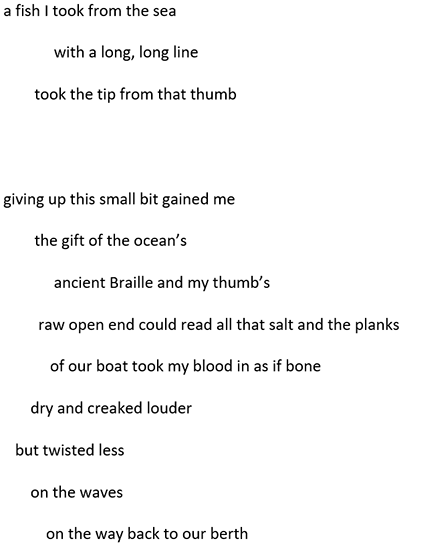Book Review: A Spoon of Honey by Ion Corcos Flutter Press, 2018

This is a beautifully evocative chapbook in which unforced, resonant details draw the reader into nuanced reflection. In his author note, Corcos describes himself as ‘travelling indefinitely’ with his partner, and the themes of rest and of restlessness are entwined throughout these poems, many of which are situated in the Greek islands, and several of which confirm that the speaker is seeking more than the experiences of a fair-weather tourist (‘Winter in Crete’). The Mediterranean details are gorgeous in themselves – the walnut trees, the olive groves, the snow-capped mountains – but there is absence, rain, the unseasonal too, freighted with memory and the ever-present challenge of communication.
The title poem sets up a ripple of expectation, question, and elusive almost-answer, and this is a significant, sustained note throughout. Questions can be enigmatic – ‘What if I told you that I was a bird, a calf/ A gust of wind?’ (‘Walnut Tree’); and the mundane juxtaposed with the serious – ‘will you find the teapot you have been looking for/ the teacups, the broken table,/ the words your father/ cannot say to you?’ (‘After’). The koan-like answers frequently invite a shift of perception, of our belief in the solidity of the self: ‘The stone is not heavy/ its blue always shifting like the sky/ nothing is permanent.’ (‘Traveller’). This acknowledgment is balanced by a sense of spiritual immanence – God within specific times and places – in ‘My God’.
Although the poems are ostensibly simple in language and layout, there is a subtle craft at work with use of repetition and refrain playing against more straightforward lyric, in ‘Overgrown Garden’ and ‘White Mountain’ for example. At their best, these poems are ‘corridors’ like the subterranean passages left by earthworms in ‘Earthworms’; lines of connection – fragile, intricate, but enduring, and things of surprising beauty in themselves. As poets should, Corcos nudges his readers to see things afresh: different ways of being and of seeing are the thematic refrain of the poems. In the rich stillness of ‘The Long Summer’, ‘the fish look like birds covered in mirrors’, a memorable image that invites the reader to participate in poetic reflection and a re-envisioning of the natural world.
(Sarah Law)


